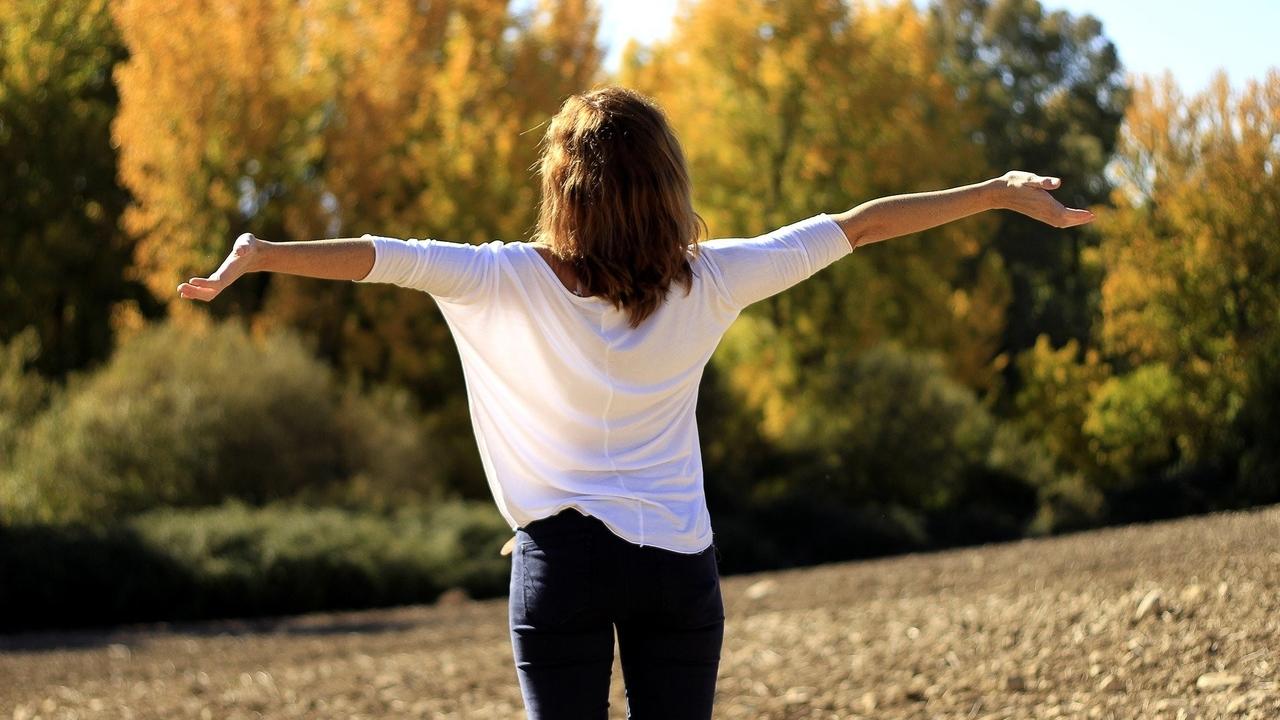Give 60 Seconds to Mindfulness

Here are my TOP 5 quick and easy mindfulness activities. Try one each day for the next five days, then keep doing your favorites regularly after that!
1. Stretch for 60 seconds.
Take 60 seconds to stretch each muscle group, starting with your feet and working your way up to your head and neck. Breathe slowly and deeply as you stretch, feeling the tension and stress leave your body. Enjoy the 60 second break in your day, while reaping the relaxing benefits of stretching.
2. Eat mindfully.
Have you ever heard of mindful eating? Well it's a thing ;) And it's probably the opposite of the fast-paced eating experience many of us are accustomed to. To practice mindful eating, take a small piece of food- for example, it could be a piece of chocolate, a blueberry or a raisin. Spend 60 seconds experiencing the item by noticing how it feels in your mouth. What does it smell like? What textures do you notice? How does it taste? Try to savor the item and pay close, mindful,...
5 Ways to Care for Your Mental Health During the Coronavirus Pandemic

Caring for your mental health is important now, more than ever. There is a lot of anxiety about COVID-19. Some people are quarantined, some are afraid to lose their jobs, and some are anxious about getting sick. Everyone is impacted in some way. I have confidence we, as a planet, will get through this. Maybe we'll even be better people because of it. More loving, grateful, appreciative, and humble, to name a few.
In the meantime, I wanted to provide you with some very good ways to care for your mental health during this difficult and unique time.
The first one helps a lot! I think it's the most important... Don't over-consume information about the virus and definitely don't read/watch virus-related information right before bed.
Connect with family and friends. This will likely be by phone or computer, but that's the way it is right now. Reach out for help and offer support. Don't hesitate to laugh and cry together. Be authentic and talk about how you...
Better Physical and Mental Health through Gratefulness

Research shows that GRATITUDE truly does have an immensely positive effect on people's lives. It improves physical health, improves the quality of relationships, and elevates the mood. Dr. Robert A. Emmons from the University of California Berkeley, has spent the past decade studying gratefulness and has concluded that it is good for our bodies, minds, and relationships.
Here is a list of the benefits of gratefulness according to studies by Emmons' research team:
Physical
• Stronger immune systems
• Less bothered by aches and pains
• Lower blood pressure
• Better sleep quality
Psychological
• Higher levels of positive emotions (e.g. more happiness!)
• More alert
• More joy and pleasure
• More optimism
Social
• More helpful, generous, and compassionate
• More forgiving
• More outgoing
• Less lonely and isolated

Wondering what steps you can take to increase gratitude? Research...
4 Ways to Achieve Your Goals in the Next DECADE

2020 is almost here! I feel like I remember gearing up for the year 2000 like it was yesterday, but here we are, about to enter a new decade and the year 2020!
We've all heard the typical advice about how to set goals for the new year - write them down, track your progress, don't give up! While I encourage you to do those things too, in this email I am going to provide you with the next level of achieving goals so they REALLY happen. If you're serious about making a change, achieving a goal, and optimizing your life this year, then these tips are for you!
#1 Get an accountability partner. Find a friend or family member who can check-in with you on your goals, and offer to do the same for them. Come up with a regular check-in day and time, like once a week. At that time, you'll ask each other about progress towards goals. Their job is not to make you do anything, rather the act of having someone else to be accountable to actually increases your chances of success.
...
5 Ways to Survive, and THRIVE, this Holiday Season

Let’s face it, the holidays can be challenging. Even the most “functional” families still have their issues, clashing personalities, and differences of opinions. But of course the holidays can also be a wonderful time of relaxation and family bonding. So, whether you’re spending the holidays with family, friends, or on your own, this article has something for you!
Try to make this holiday season the best one yet with these 5 ways to survive, and even thrive, this holiday season.
- Keep your expectations reasonable. Don’t expect your friends or family to have changed. The same person who drove you crazy last year with questions about why you’re still single or why you chose “that” job, or whatever, will probably drive you crazy again this year. Plan on it and don’t let it get to you. You might even try to find some humor in the situation.
- If you’re spending time with family or friends, try to focus on what you appreciate...
5 Stages of Change: go from where you are to where you want to be

The 5 Stages of Change can help you establish where you are and where you want to be.
Think about your answer to this question: What change do you want to make to better your life?
It may be a goal to exercise more, be more productive at work, have a better relationship with your spouse, lose weight, quit smoking, reduce alcohol, meditate more, reduce stress, eat better, etc. Think about your goal and where you fall in terms of the 5 Stages of Change outlined below:
#1 Precontemplation- As the word indicates, at this stage the person is not planning to change the behavior, may not see a reason to change, and has no interest in changing. They may see the cons of change as outweighing the pros. For example, a person may have a problem with alcohol, but they don’t yet identify it as a problem, nor do they have any plans to change their drinking habits.
#2 Contemplation- People may still feel ambivalent at this stage, but they are beginning...
10 Ways to Achieve Your Exercise Goals

Exercise can help reduce symptoms of mild to moderate anxiety and depression. Reap the mental health benefits of exercise!
Here are 10 tips to help get you started with exercise - if you're already exercising regularly, these tips can help keep you motivated!
I realize that ability levels, time constraints, and interests regarding exercise vary, so I've tried to include something for everyone. Of this list, pick your top 3-5 favorite to help you get your exercise to an optimal level:
Exercise first thing in the morning. There are a few reasons why this works best- you have the most energy in the morning and if, you wait until the afternoon or evening, you might not get around to it. Something else will come up that distracts you from the plan of exercise. Sometimes gyms are less crowded before the workday than after. Exercising in the morning is actually something I started doing recently and it makes a huge difference! You also start your day with an...
The Benefits of Exercise for Mental Health

Research shows that mild to moderate depression can be treated with exercise, and the benefits are often equal to taking antidepressant medications. Sure, taking a pill may seem quicker and easier, but exercise not only alleviates the symptoms of depression, it also gives you many other health benefits (both mental AND physical), and none of the side-effects that can come with medication. (Note: If you are taking antidepressant medication- or any medication prescribed by your doctor- please talk to your doctor before making changes).
There are several reasons why exercise helps with depression, including the release of endorphins in the brain, and the promotion of neural growth. Seems like some great reasons to hit the gym to me!
Exercise is also an amazing treatment for anxiety. Have you ever noticed that a couple of hours after vigorous exercise, you feel more relaxed but also alert? In other words, exercise calms the nerves without making you tired. Just as...
Get an Afternoon Boost WITHOUT Caffeine

Many people get their morning boost from a cup or two of coffee. I’m one of those people, so I get it! But what can you do in the afternoon to get a boost, that won't interrupt your ability to sleep later?
Let me start by saying that coffee, and other caffeinated beverages, are often responsible for keeping us awake at night. Sometimes clients will report to me that they have trouble falling asleep, and when we discuss caffeine, they’ll say something like this: “That’s not the problem, I don’t drink coffee after 3 PM.”
For a lot of people, though, 3 PM is too late to have your last sip of coffee. Sorry to be the bearer of bad news, but it’s important for you to know that coffee after 12 or 1 PM, may keep you up at night. This is because it can take 8 hours (give or take) for caffeine to leave your system, so not consuming caffeine in the afternoon is super important to getting a good night’s sleep. Remember,...
Use the Mind-Body Connection for Healing

What I'm about to explain is simply amazing, motivating, and essential for every person to know!
First, ever had that feeling when you are anxious and you get butterflies in your stomach? This is a great example of the very direct connection between the mind and body.
So here's the coolest thing... The mind has been proven to heal the body. This is because the body is always responding to the way the mind is thinking and feeling. In fact, the immune cells that fight disease are triggered by multiple neurotransmitters in the brain. So your brain can send your cells messages to help you heal!

The implications of this are fascinating to me. Could this mean that focusing your mind on healing a certain area of your body could actually increase the immune response to that area and help it heal? This would certainly make sense! And some research supports this too. In fact, this helps explain why some people experience improvements from placebo...

